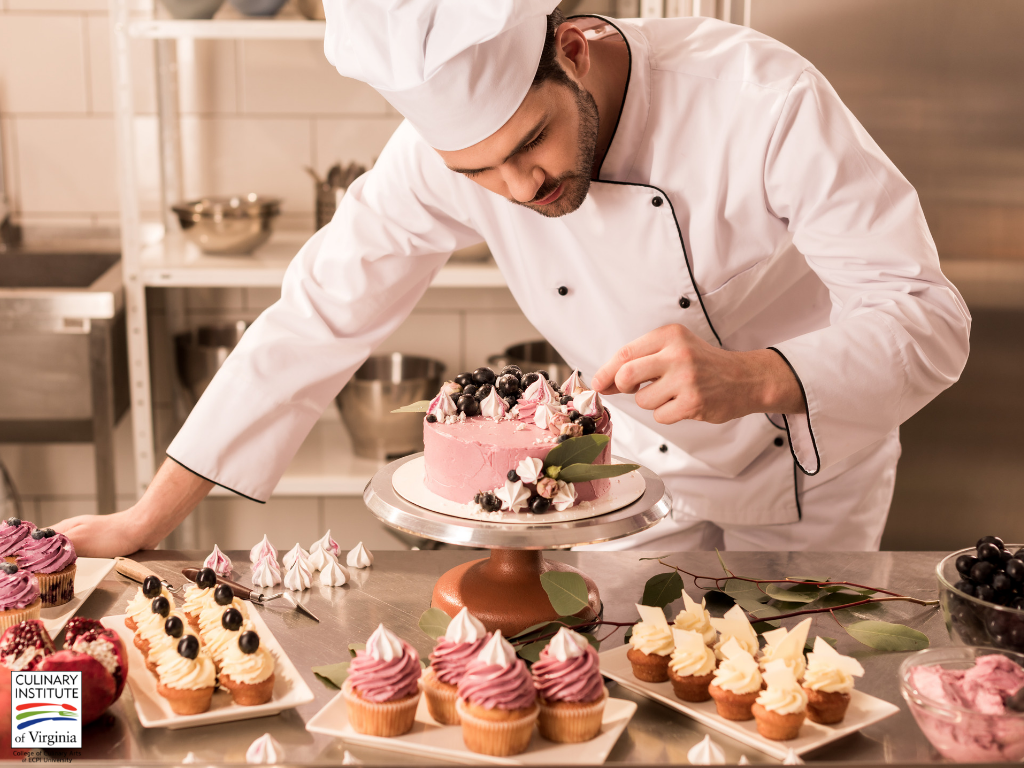
What is a Dessert Chef Called: Baking and Pastry Terminology for Culinary Students
Culinary professionals blend their cooking skills with a splash of creativity and artistry to create a wide range of baked goods and pastries. If creating tasty tarts and clever cakes sounds like something you would love doing, consider enrolling into a culinary school and working hand-in-spoon with chef instructors and experienced bakers, to navigate this dynamic segment of the food service industry.
If you're wondering just how you're going to learn all of the terminology that goes along with baking and pastry arts, let's take a look at some of the common words used to describe and define the science of baking and the art of dessert.
Baking and Pastry Terminology
Here are some common baking and pastry terminologies to understand before you get started in this exciting field.
Blanch: Blanching is a two-part process. First the item in question (for example, almonds) are put into boiling water to soften them. Then, to stop the cooking process, the almonds are placed into ice cold water. It's similar to how hardboiled eggs are made.
Caramelize: If you want to caramelize meat or vegetables, melt sugar until it browns. When doing this, always watch your pan! You don't want anything to burn.
Soft Peaks: You might have heard someone in a cooking show talk about turning an item into soft peaks. But what does it mean? Basically, soft peaks occur when egg whites or whipping cream are progressively beaten until the mixture becomes fluffy, slightly solidified, and can create gentle, sloping peaks when the utensil is lifted out of the mixture. This is best accomplished with a mixer.
Patissier: A dessert chef is often called a pastry chef, or, if you're fancy, a patissier. They are considered the dessert experts in the kitchen!
There are so many more baking terms for you to learn. Be sure to start familiarizing yourself now, before you even step into the school kitchen.
Why is Formal Education Important in the Culinary Arts Field?
The Culinary Arts are one of those unique fields where half the experts are self-made, and the other half have formal education. There are numerous seasoned chefs and cooks who have never stepped into a formal classroom. However, many established hotels and bakeries require bakers to have culinary arts formal education. So, why is education important for someone who aspires to work in the culinary field?
Put simply, being a professional chef is more complex than being an excellent cook. There are any techniques, rules, and hierarchies that are specific to professional chef's kitchens, which would be difficult (if not impossible) to learn outside of culinary school. Each member of a chef's kitchen has a special title, a specialized skill, and a certain area of the kitchen for which they are responsible.
A formal culinary arts education is designed to equip students with skills and knowledge to effectively work in a chef's kitchen. Food safety procedures are vital for every food worker's job. With formal education in culinary arts, students could get helpful instruction on temperatures, cooling, and hygiene to ensure that future customers are protected from food-borne illnesses.
The activities in a working kitchen can be technically complex, and no one has the time to instruct beginners on how to handle knives, commercial ovens, or deep fryers. All these essential skills are taught in a culinary school. Moreover, your best recipe can be useless without the right ingredients. With culinary education, students typically learn how to select the best ingredients within any budget.
The Benefits of Culinary Arts Professionals with Formal Education VS. Self-taught Cooks
Other than generally equipping students with the right skills, formal education in culinary arts has several long-term benefits:
- Exposure to a variety of job duties and techniques in a professional kitchen, helping you determine whether this path is right for you.
- Expanded knowledge of flavors, combinations, techniques, and culinary history, enhancing your ability to combine flavors and create recipes.
- Graduating from a formal culinary program signifies that you have the proper education, training, skills, and knowledge to hit the ground running.
- A diploma or a degree from an accredited cooking school can validate your knowledge and skills, proving you have the recipe for success.
Are You Ready to Step Into a Culinary Arts School Kitchen?
Interested in learning more about baking and pastry arts? If you want to earn an Associate of Applied Science in Baking and Pastry Arts, ECPI University's Culinary Institute of Virginia offers this program at an accelerated pace. For more information, connect with a friendly admissions advisor today.
It could be the Best Decision You Ever Make!
DISCLAIMER - ECPI University makes no claim, warranty, or guarantee as to actual employability or earning potential to current, past or future students or graduates of any educational program we offer. The ECPI University website is published for informational purposes only. Every effort is made to ensure the accuracy of information contained on the ECPI.edu domain; however, no warranty of accuracy is made. No contractual rights, either expressed or implied, are created by its content.
For more information about ECPI University or any of our programs click here: http://www.ecpi.edu/.



